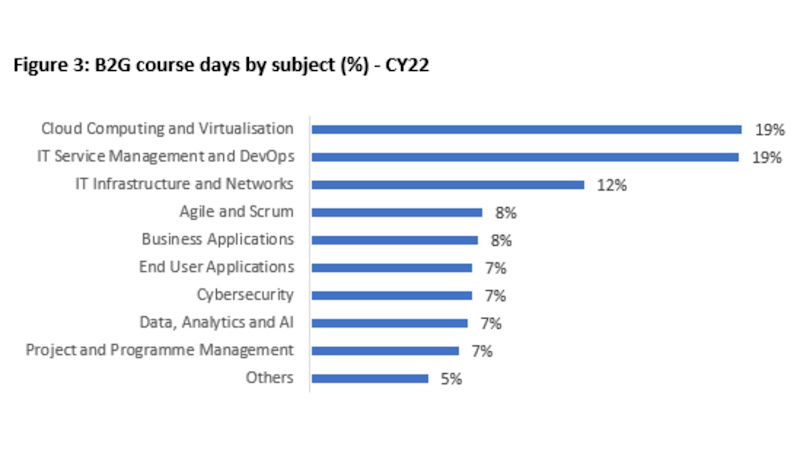Despite what on the outside looks like a wholescale departure to “the cloud”, it would be easy to think that establishing and maintaining a robust IT infrastructure, including the networks, was someone else’s problem. Ensuring the infrastructure is doing its job is vital, especially in the public sector.
This is evidenced by the demand for specialist infrastructure courses from Government agencies in Australia. A well-established IT framework is the backbone of modern governance.
In fact, among Lumify Group learners from the public sector and government agencies, IT Infrastructure and Networks is in the top 3 most popular course categories.
The Significance of IT Infrastructure Management Courses for Government Agencies
Government agencies are no exception in an era where technology shapes almost every aspect of our lives. IT infrastructure and networks courses offer invaluable insights into complex digital systems' design, implementation and management.
Here's why they are of paramount significance:
Efficiency and Service Delivery: Government agencies are responsible for delivering a wide array of public services, from healthcare to transportation. An efficient Government IT infrastructure ensures streamlined processes, reducing bureaucratic hurdles and enhancing service delivery. Courses focusing on IT systems management can equip government professionals with the skills to optimise workflows and improve the citizen experience.
Data Security and Privacy: Efficient IT systems can lead to substantial cost savings in the long run. Government agencies can allocate resources more effectively by optimising processes, reducing manual work, and preventing data breaches. IT infrastructure and networks courses teach professionals how to identify and implement cost-saving opportunities successfully.
Interagency Collaboration: Many government functions involve collaboration between different agencies at various levels. A well-designed IT infrastructure allows for seamless communication and information sharing. Professionals trained in IT networks can implement systems that facilitate interagency cooperation and data exchange, leading to more effective governance.
Cost Savings: Efficient IT systems can lead to substantial cost savings in the long run. Government agencies can allocate resources more effectively by optimising processes, reducing manual work, and preventing data breaches. IT infrastructure and networks courses teach professionals how to identify and implement cost-saving opportunities successfully.
Preparedness for Future Challenges: The digital landscape constantly evolves, with new technologies and threats emerging regularly. Government agencies must stay ahead of the curve to address future challenges effectively. IT courses provide the knowledge and adaptability necessary to embrace technological advancements and proactively tackle potential disruptions.
Benefits of IT Infrastructure and Networks Courses
Leaders in the public sector stand to gain numerous benefits by investing in Federal and local Government IT infrastructure and networks courses for their employees:
Enhanced Skill set: Gain a comprehensive understanding of IT systems, networks, and security protocols. Government professionals can acquire network design, cloud computing, data management, and more skills, enabling them to make informed decisions and implement best practices.
Cyber Security Expertise: With the rising frequency and complexity of cyberattacks, having a workforce well-versed in cyber security is crucial. IT courses provide insights into threat detection, risk assessment, and incident response, reducing vulnerabilities and fortifying digital defences.
Improved Efficiency: Identify bottlenecks, streamline processes, and implement automation where possible. Better IT Infra management leads to improved operational efficiency, reduced downtime, and faster service delivery.
Effective Resource Allocation: By optimising IT systems, agencies can allocate resources more strategically. This includes better management of hardware and software assets and optimising energy consumption in data centres.
Innovation and Modernisation: Embracing new technologies is critical to staying relevant and efficient. IT courses expose government professionals to emerging trends such as the Internet of Things (IoT), artificial intelligence (AI), and blockchain, enabling agencies to explore innovative solutions for public service delivery.
Compliance and Governance: Government agencies must adhere to specific regulations and standards. IT courses can educate professionals about compliance requirements and governance frameworks, ensuring digital systems meet legal and ethical standards.
Problem-Solving and Decision-Making: IT infrastructure and networks courses teach critical thinking skills for troubleshooting and decision-making in technology-related scenarios. Decision-making enhances the ability of government professionals to resolve issues swiftly and make informed choices.
IT Infrastructure and Networks Courses with Lumify
Lumify Work (formerly DDLS Training) is APAC’s largest and most experienced provider of authorised Cisco training, with real-world experience to add depth to every course. We are an accredited CompTIA training organisation, a Microsoft Training Services Cloud Partner, train teams to utilise microservice architectures using Red Hat, and much more. We share the most popular IT infrastructure training courses available with Lumify.
CNS-225 Deploy and Manage Citrix ADC 13.x with Traffic Management
Build your Citrix ADC knowledge and skills by enrolling in this five-day course. This course is a combination of CNS-223 and CNS-224. Training covers Citrix ADC essentials – platforms, architecture, licensing and functionality – and also focuses on traffic management, including content switching, traffic optimisation and global server load balancing (GSLB).
CompTIA Network+
CompTIA Network+ validates the technical skills needed to securely establish, maintain and troubleshoot the essential networks that businesses rely on. This five-day course helps prepare you for the CompTIA Network+ N10-008 exam, which validates the skills required to implement enterprise-level wired and wireless network solutions, identify and troubleshoot network performance issues, and harden networks against threats to mitigate security vulnerabilities.
Implementing and Administering Cisco Solutions (CCNA)
Get a broad range of fundamental knowledge for all IT careers. You will learn how to install, operate, configure, and verify basic IPv4 and IPv6 networks through a combination of lecture, hands-on labs, and self-study.
Implementing and Operating Cisco Enterprise Network Core Technologies (ENCOR)
Gain the knowledge and skills to configure, troubleshoot, and manage enterprise wired and wireless networks. Learn to implement security principles within an enterprise network and how to overlay network design using solutions such as SD-Access and SD-WAN.
Microsoft MD-102T00 - Microsoft 365 Endpoint Administrator
Learn to plan and execute an endpoint deployment strategy using contemporary deployment techniques and implementing update strategies. The course introduces essential elements of modern management, co-management approaches, and Microsoft Intune integration. It covers app deployment, management of browser-based applications, and key security concepts such as authentication, identities, access, and compliance policies.
RH124 - Red Hat System Administration I
RH124 is the first of two courses covering the core system administration tasks needed to manage Red Hat Enterprise Linux servers. This training is designed for IT professionals even if they do not have previous Linux system administration experience. Gain Linux administration competence by focusing on core administration tasks.
IT Infrastructure and Networks and ITIL
IT infrastructure and ITIL® are symbiotic. Where ITIL serves as a comprehensive framework for managing and optimising various aspects of IT infrastructure. ITIL provides guidelines and best practices for designing, implementing. And maintaining IT systems. These two contribute to the efficient operation and infrastructure alignment with business goals. By adhering to ITIL principles, organisations can enhance their IT infrastructure's reliability, scalability, and overall performance while ensuring seamless alignment with their operational and strategic needs.
We offer many ITIL training courses and are an Accredited Training Organisation for PeopleCert courses and certifications, including ITIL, PRINCE2, MSP, AgileSHIFT, MoP, and P3O. Lumify is also an IT Service Management Forum (itSMF) member. The majority of our ITIL instructors have an Expert Level of ITIL Certification in addition to practical, real-world implementation and consulting experience in ITIL.
And with the Lumify Anywhere platform, you can complete ITIL and IT Infrastructure and Networks Courses from the comfort of your home, your office, one of our campuses – or wherever it suits you best. Enquire about course options, modalities and schedules; contact our team.









